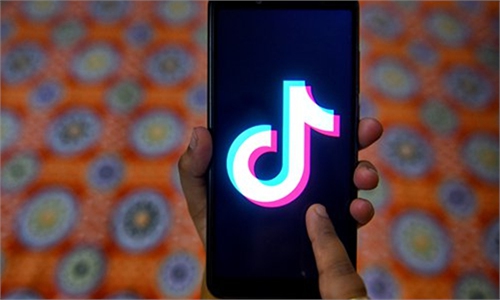
The logo of TikTok application is seen on a screen in this picture illustration taken February 21, 2019. Photo: VCG
US President Donald Trump on Tuesday said his administration is considering banning Chinese social media app TikTok in the US, adding that it is "one of many" options he is considering to punish China over the novel coronavirus. One day before Trump's comments, US Secretary of State Mike Pompeo said that the US is "looking at" banning Chinese social media apps, including TikTok. Pompeo claimed that people should download the Chinese app only "if you want your private information in the hands of the Chinese Communist Party."This is not the first time that US politicians have issued threats to the Chinese short-video sharing app. The tech company is facing an increasingly difficult situation operating in the US. Some people may argue that China also blocked US tech companies, such as Google, in the Chinese mainland. But this is a totally different scenario and is not comparable.
China requested US internet companies, including Google, to comply with Chinese laws and regulations, which are reasonable demands, if they want to operate in China. However, Google withdrew from China in 2010 and announced it was "no longer willing to continue censoring" results on the website.
TikTok, however, complies with US laws. The company has previously confirmed that data of US users is stored in the US, its data centers are located entirely outside of China, and does not send any user data back to China. In May, TikTok appointed American businessman and former Walt Disney Company top streaming executive Kevin Mayer as its CEO. Cautious and lawful as it is, TikTok is still facing huge uncertainty in the US. The US has become much too intolerant on China.
China welcomes these US companies to return to the Chinese mainland as long as they comply with China's laws. In 2018, Google planned to return to the Chinese mainland by launching its Dragonfly search engine, but the company finally gave it up due to US political pressure. In addition, although China has never interfered in other countries' choice of internet applications, Pompeo did encourage India's ban on 59 Chinese apps, including TikTok.
TikTok is popular in the US, especially among young Americans. About 60 percent of TikTok's 26.5 million monthly active users in the US are between the ages of 16 and 24, according to the company's data in 2019.
It seems that the US cannot even bear a Chinese entertainment app. The US' possible ban of TikTok and other Chinese social media apps shows nothing but its discrimination and lack of confidence. Will it be that only US technology companies can operate in the country? This is too far away from the US spirit of openness. On Tuesday - only one day after Pompeo hinted about a possible ban on TikTok - French President Emmanuel Macron used TikTok for the first time to congratulate French school leavers after their exam results. The US has almost squandered its leadership, and even some of its traditional allies have charted a different path from Washington.
If the US government does move to ban TikTok, the protectionist policy is against the free market spirit that the US has always advocated. It is retrogression. Politicizing technology will only undermine its own technological competitiveness.
China's management of the internet has proven to be indispensable, and a number of competitive Chinese internet companies have emerged. Hopefully, the US can still maintain its competitive edge with an open attitude, instead of using politics to suppress its opponents.


